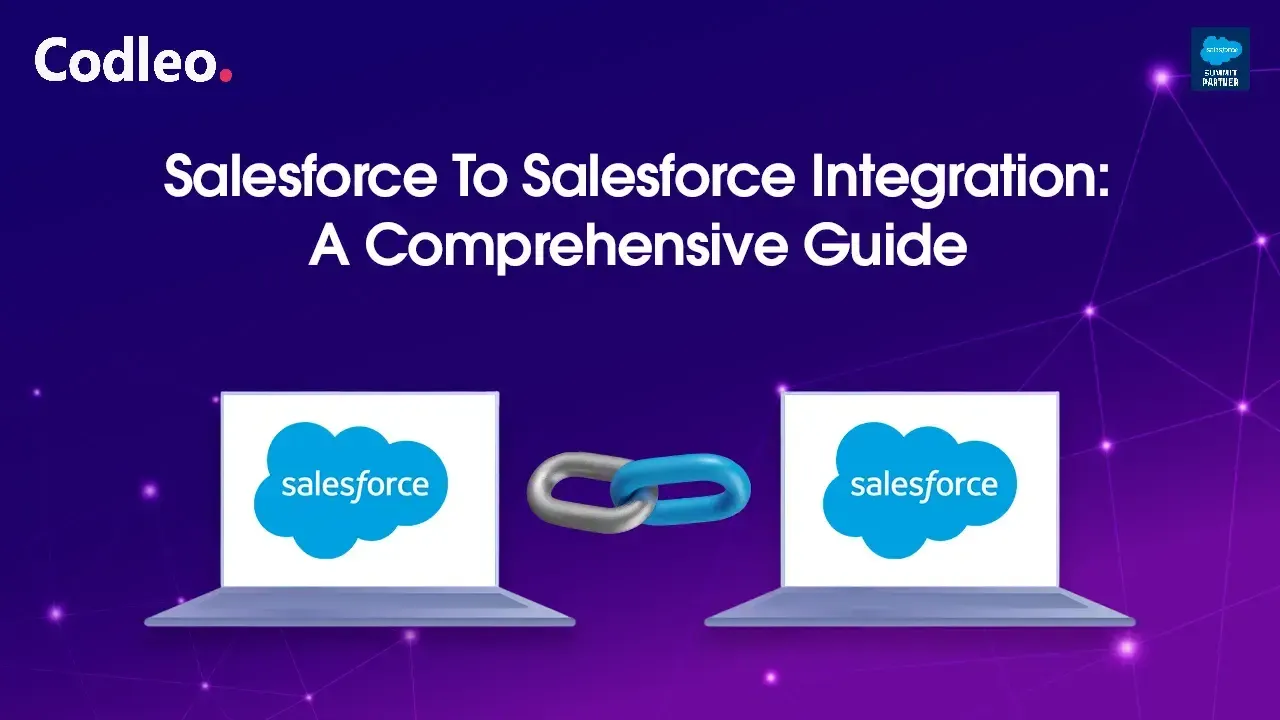Publish date:
Let’s talk about Salesforce and NetSuite. Salesforce is the leading provider of customer relationship management (CRM) software worldwide, and it stands out as the best choice in its category. Similarly, NetSuite is a major player in the enterprise resource planning (ERP) market today. As a result, many companies opt to utilize both Salesforce and NetSuite. What is surprising is that.
Many companies use both Salesforce and NetSuite without fully connecting the two systems. While Salesforce and NetSuite work well on their own, not sharing information between them—and among the teams that use them—can create issues. These issues can hinder your business operations and lead to increased expenses.
This article will explain how to connect Salesforce and NetSuite. By integrating your customer relationship management (CRM) system with your enterprise resource planning (ERP) system, you can streamline processes, solve problems, and add value to your business.
What is the Function of NetSuite?
NetSuite is a comprehensive ERP software that enables companies to manage their operations more effectively. It offers a collection of applications that help businesses run smoothly, understand their performance, and achieve greater efficiency and cost savings. This software automates key business processes and provides real-time insights into operational and financial performance, enabling organizations to make informed decisions.
This platform provides a suite of tools that enable businesses to operate effectively, monitor their performance, and achieve substantial efficiency improvements.
To enhance performance and streamline business processes, NetSuite provides five key functions, including:
-
Accounting and operations
-
CRM
-
eCommerce
-
Business Intelligence
-
Business process management
NetSuite functions aim to improve business processes by consolidating all enterprise functions into a single application, utilizing a unified code and database.
What is the Function of Salesforce?
Salesforce is a well-known CRM solution that has quickly become a leader in the industry. This platform helps companies manage their marketing, sales, services, IT, finance, and commerce teams from anywhere in the world, at any time. Its goal is to keep customers happy.
When it comes to Salesforce CRM functions, it offers a lot more effective solutions, including-
-
Marketing administration
-
Salesforce administration
-
Customer services and support automation
-
Enterprise social networking
-
Salesforce CRM record life cycle
Salesforce is a tool that allows developers to write code. This code can connect with data and events on the Salesforce platform..
-
The Salesforce function majorly helps in:
-
Delivering a connected experience with Salesforce data
-
Meeting business requirements with on-demand trusted infrastructure
-
Seamless access to data in the organization
-
Data can be easily integrated with low-code/pro-code services
Moving on, let’s discuss:
Salesforce & NetSuite Integration – It’s All About the Data
Think about all the information stored in Salesforce. You have leads, opportunities, closed deals, sales history, customer contact details, and customer preferences. That’s just the beginning, especially when you include custom fields specific to your business.
Now, consider what’s in NetSuite. You have orders, invoices, payment status, payment history, inventory, lead times, and delivery schedules. Again, that’s just the start of the list.
Sales representatives need to regularly share essential data with Salesforce and NetSuite users. They need information about inventory and lead times to prevent selling items that the company cannot deliver on time. The finance team needs customer information and opportunity details to create and send invoices.
Your Sales Ops team needs to know if invoices are paid to calculate commissions accurately. Customer Success Representatives need payment history to reach out to accounts that are struggling.
A significant amount of data is shared between Salesforce and NetSuite.
Integrating Salesforce and NetSuite allows data to flow automatically between these systems. It eliminates the need for emails, manual data entry, and back-and-forth tasks that can slow you down and lead to costly mistakes. This integration must maintain the distinct roles of both systems.
Next, we will explore how this data exchange can solve problems and enhance performance for you and your team.
Navigating Economic Turbulence
Is syncing data between Salesforce and NetSuite worth the effort?
It is an important question, especially in 2023, when many leaders are carefully reviewing their spending. A recent report from Flexera shows that nearly one-third of the expenditure on software as a service (SaaS) is wasted. It has prompted budget managers to seek ways to cut costs and focus on what they truly need.
Yes, businesses should develop a strong framework to handle economic uncertainties and invest in practical solutions. By integrating your CRM and ERP systems, you can enhance operational efficiency, address revenue operations weaknesses, and achieve a rapid return on investment.
Here’s a closer look at how integrating Salesforce and NetSuite can create value and why it should be a top priority for you.
Connect Your Core Business Functions
Connecting your CRM and ERP systems enhances teamwork between key departments, including Sales, Operations, Finance, and Service.
Here are four quick examples to help you see what this better connection looks like:
-
Sales team members can see live inventory data from NetSuite in Salesforce.
-
Finance has the data to calculate and pay accurate Sales commissions, and Sales has visibility of it
-
Operations can see Sales order details in NetSuite as soon as a deal closes
-
Customer Success teams can view payment status and history in Salesforce when interacting with customers.
It is important because it speeds up your work and reduces frustrating handoffs and miscommunications. As a result, processes like CPQ, order fulfillment, production planning, and customer service become faster, better, and more efficient.
Transform CPQ Accuracy & Speed
Integration allows your Sales team to access live inventory data directly within Salesforce. Sales reps can also view the latest product descriptions, pricing, and lead times. This access to real-time data significantly improves your CPQ process.
Your Sales team no longer has to wait for information, sell unavailable products, promise impossible delivery times, or offer bad deals based on old prices.
Now, they can quickly access all the data they need to create accurate quotes for customers.
Upgrade Field Sales & Service Efficiency
How great would it be if your Field Sales reps could spend more time with your best customers instead of trying to upsell clients who haven’t paid their invoices for three months?
What about Field Service? What if you never had to send agents to work for customers who have lapsed maintenance contracts? Or never had to reschedule a repair visit because the parts you need are not available?
Integrating your CRM and ERP systems enables you to share data seamlessly between Salesforce and NetSuite. This connection brings these ideas to life, turning them from fantasy into reality.
Field sales representatives can access customer payment history in Salesforce. It helps them understand the status of each account before visiting or scheduling a meeting.
Managers in Field Service can check contract status and part availability before scheduling their teams. It helps save time and money while also improving the Sales and Service experience for loyal customers.
It Doesn’t Have to Be a Long, Complicated Project
Integrating Salesforce and NetSuite doesn’t have to be stressful or complicated. You don’t need to write code or use complex integration platforms like Celigo or MuleSoft.
Thanks to innovative partners, you can find simple, ready-to-use integration solutions. These can set up a fully functioning Salesforce and NetSuite connection in less than a week.
Top Benefits of Integrating NetSuite with Salesforce
NetSuite and Salesforce can help businesses succeed by enhancing their operational efficiency. They enable seamless data transfer from sales leads to invoices. These platforms allow companies to establish a robust market presence and cultivate stronger customer relationships. In addition to these advantages, they offer other benefits. Here are the key benefits that make these platforms popular and effective:
1. It streamlines the procedures
NetSuite and Salesforce help businesses run more efficiently. They connect all parts of an organization, provide real-time insights for better decision-making, and create a standard workflow for business processes. This support enables businesses to grow and enhance their operations.
2. Improves team productivity and cash flow
The second main benefit of integrating NetSuite with Salesforce is that it improves cash flow and team efficiency. NetSuite accounting software enables users to create more accurate financial reports, track expenses, and manage bookkeeping and revenue effectively. It provides a clear view of the organization’s economic health. Meanwhile, Salesforce connects different departments on a single platform, making communication easier and enhancing employee productivity.
3. Access to valuable information
NetSuite and Salesforce integration provide organizations with the necessary access to valuable client information. It gives accurate customer data and enables growth. These platforms help manage subscription renewals, track referrals, pending orders, and facilitate upselling or cross-selling products across different departments. It makes client information easier to access, assisting businesses to keep better track of their clients.
Last but not least,
How can Codleo help you with NetSuite Salesforce Integration?
Looking to integrate Salesforce with NetSuite the right way? As a trusted Salesforce partner, we offer tailored Salesforce integration services designed to fit your business needs—whether you’re connecting ERPs, CRMs, or custom apps. From planning to post-launch support, our Salesforce integration support team ensures a smooth, reliable experience every step of the way. Let’s simplify your systems and unlock better performance together.
Codleo has over six years of experience helping thousands of customers with integrations. We offer the best Salesforce-NetSuite connector. As a leading Salesforce development company, we have more than six years of experience in CRM solutions. Our team of Salesforce consultants and developers will guide you through the NetSuite Salesforce integration process.
Whether you need to connect NetSuite and Salesforce using Boomi, Mulesoft, Celigo, or REST APIs, our developers are here to assist you with the latest integration methods. We offer pre-built, fully managed solutions tailored to your needs, helping your product succeed.
You can also utilize our Salesforce consulting services to discuss your requirements and explore top-notch integration options.
Summary
Connecting Salesforce and NetSuite can significantly enhance efficiency and performance across various departments. It's an investment that pays off quickly.
New, easy-to-use solutions make it simple to integrate CRM and ERP systems. You shouldn’t worry about integration; there are many good reasons to prioritize it soon.
FAQ
NetSuite can connect with many popular software applications and systems, both online and on-site. These include Salesforce, SAP, Oracle, and Google Apps.
The NetSuite connector is a tool that helps you connect your NetSuite account with your eCommerce stores, point-of-sale (POS) systems, and online marketplaces. It allows you to set up how your data will flow between these systems.
NetSuite uses an Oracle database to store financial records and business deals.
The cost of integrating NetSuite with Salesforce depends on your business needs and the platforms you choose. You can integrate NetSuite with Boomi, Mulesoft, REST APIs, or Celigo. The best option for you will depend on your business's needs.
Connecting Salesforce and NetSuite brings together your CRM and ERP systems, making information flow smoothly throughout your business. This connection removes data silos, reduces manual data entry, and ensures that everyone—from sales and customer service to finance and operations—uses the same up-to-date information. As a result, you gain better efficiency, improved customer experiences, and informed decision-making based on real-time data.
When deciding between Celigo, MuleSoft, and Boomi, think about your specific needs. If your needs are simple, Celigo is a good choice. For more complex tasks, MuleSoft works best. If you want something easy to use, choose Boomi. Consider your budget and your team's skills before making a decision.
While integration offers significant benefits, there can be particular challenges as listed below:
Data mapping to ensure correct alignment.
Complex workflows may need custom solutions.
This role requires technical expertise, especially for API development.
Time and cost investment upfront.
The cost of integrating Salesforce with NetSuite depends on the method you choose. Third-party tools, like Celigo or Boomi, have monthly fees. Custom development costs more upfront. The complexity of the integration and the need for ongoing maintenance can also influence the price. However, the advantages, such as improved efficiency and better data accuracy, usually make it worth the initial expense.















